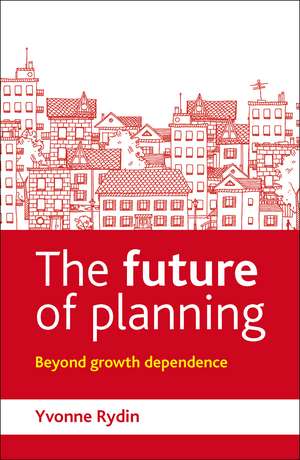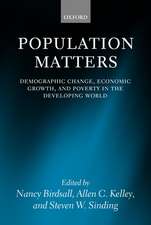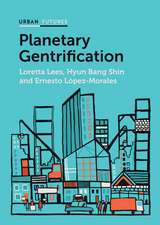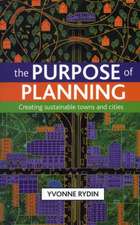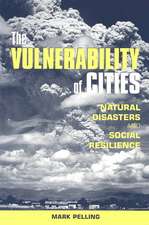The Future of Planning: Beyond Growth Dependence
Autor Yvonne Rydinen Limba Engleză Hardback – 10 sep 2013
For the past fifty years, urban planning has revolved around the presumed necessity of perpetual growth and development. Contending that the supposed benefits of endless growth cannot—and should not—be taken for granted, The Future of Planning comprises a timely exploration of alternative urban development models. Filled with practical suggestions that establish a new planning agenda, it proposes new ways to protect and enhance existing low-value land uses as well as the means of managing community assets within the built environment. This book will be essential reading for planning students, scholars, and practitioners.
| Toate formatele și edițiile | Preț | Express |
|---|---|---|
| Paperback (1) | 267.17 lei 3-5 săpt. | |
| Bristol University Press – 10 sep 2013 | 267.17 lei 3-5 săpt. | |
| Hardback (1) | 771.29 lei 6-8 săpt. | |
| Bristol University Press – 10 sep 2013 | 771.29 lei 6-8 săpt. |
Preț: 771.29 lei
Preț vechi: 1001.68 lei
-23% Nou
Puncte Express: 1157
Preț estimativ în valută:
147.63€ • 160.42$ • 124.09£
147.63€ • 160.42$ • 124.09£
Carte tipărită la comandă
Livrare economică 21 aprilie-05 mai
Preluare comenzi: 021 569.72.76
Specificații
ISBN-13: 9781447308416
ISBN-10: 1447308417
Pagini: 240
Dimensiuni: 127 x 197 x 18 mm
Greutate: 0.36 kg
Ediția:New.
Editura: Bristol University Press
Colecția Policy Press
ISBN-10: 1447308417
Pagini: 240
Dimensiuni: 127 x 197 x 18 mm
Greutate: 0.36 kg
Ediția:New.
Editura: Bristol University Press
Colecția Policy Press
Notă biografică
Yvonne Rydin is professor of planning, environment, and public policy at the Bartlett School of Planning at University College London.
Cuprins
List of figures, tables and boxes
Preface
1 Introducing growth-dependant planning
Welcome to Anywheretown – the home of growth dependence!
Governance: the context for growth dependence
Alternative responses to growth dependence
The structure of the book
2 Embedding growth dependence in the planning system
Planners’ growing dependence on growth
The institutions of contemporary planning practice
3 The growth-dependant planning paradigm
The economic model underpinning growth-dependant planning
The direct and consequential benefits of promoting development
The side-benefits of promoting development
4 The flawed economic assumptions of growth-dependant planning
The core assumption of economic growth
Spatial patterns of economic growth
Coping with economic restructuring
Leveraging private sector development
5 The environmental and social consequences of growth-dependant planning
Growth-dependant planning as green growth
The implications of environmental sustainability
Growth-dependant planning as land value uplift
The implications for local communities
6 Reforming the planning agenda
From growth to well-being
Well-being, tackling inequalities and sustainability
Reframing planning for just sustainability
The need for reformed planning institutions
7 Alternative development models
Affordable housing
The Garden City model
Community development and land trusts
Self-build and plotlands
Finding low-value land
8 Protecting and improving existing places
Protecting existing land uses from development pressures
Improving housing standards
Town centre enhancement
Spaces for small and medium-sized enterprises
Vacant property and land
9 Assets in common
The limitations of private provision and management
Community ownership and management
Buying and funding community assets
Managing community assets
10 Reforming the planning system
The argument of the book
Reformed planning policy guidance
Reformed planning tools
Reformed community engagement
Bringing it all together
Notes
References
Index
Preface
1 Introducing growth-dependant planning
Welcome to Anywheretown – the home of growth dependence!
Governance: the context for growth dependence
Alternative responses to growth dependence
The structure of the book
2 Embedding growth dependence in the planning system
Planners’ growing dependence on growth
The institutions of contemporary planning practice
3 The growth-dependant planning paradigm
The economic model underpinning growth-dependant planning
The direct and consequential benefits of promoting development
The side-benefits of promoting development
4 The flawed economic assumptions of growth-dependant planning
The core assumption of economic growth
Spatial patterns of economic growth
Coping with economic restructuring
Leveraging private sector development
5 The environmental and social consequences of growth-dependant planning
Growth-dependant planning as green growth
The implications of environmental sustainability
Growth-dependant planning as land value uplift
The implications for local communities
6 Reforming the planning agenda
From growth to well-being
Well-being, tackling inequalities and sustainability
Reframing planning for just sustainability
The need for reformed planning institutions
7 Alternative development models
Affordable housing
The Garden City model
Community development and land trusts
Self-build and plotlands
Finding low-value land
8 Protecting and improving existing places
Protecting existing land uses from development pressures
Improving housing standards
Town centre enhancement
Spaces for small and medium-sized enterprises
Vacant property and land
9 Assets in common
The limitations of private provision and management
Community ownership and management
Buying and funding community assets
Managing community assets
10 Reforming the planning system
The argument of the book
Reformed planning policy guidance
Reformed planning tools
Reformed community engagement
Bringing it all together
Notes
References
Index
Recenzii
"In this excellent book, Yvonne Rydin skillfully critiques the current growth-dependent British planning system while offering a comprehensive and progressive agenda for its reform using the concept of ‘just sustainability.’"
